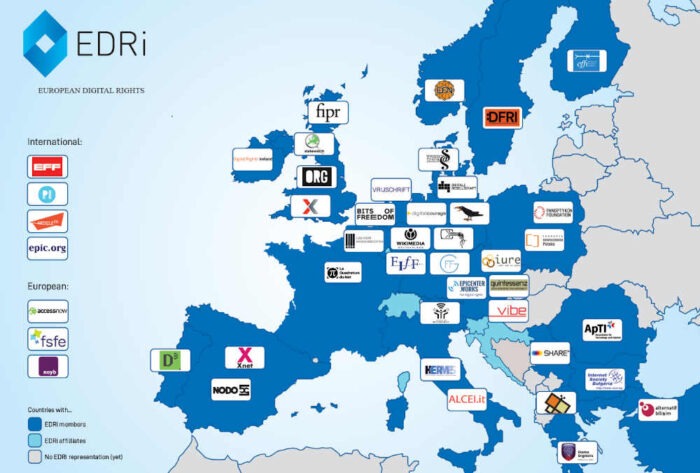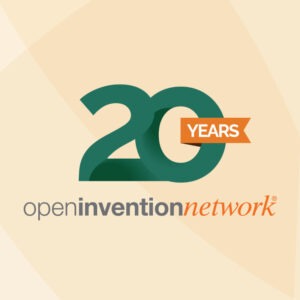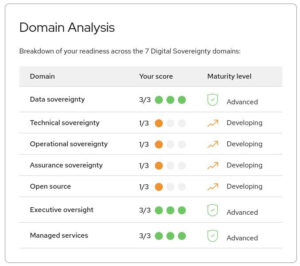Relatively unknown in the US, the European Digital Rights organization is a big deal in the EU. In this article, we look at many of the more than 50 organizations that lend their support and guidance to the organization.

With the European Digital Rights organization writing an open letter to European Commission President Ursula von der Leyen last week, urging her to not let President Trump and the tech cronies surrounding him bully the EU, it begs the question, at least in most minds stateside: what is the EDRi and what does represent?
When we looked into the Brussels-based organization, it turned out that it’s the largest European network defending rights and freedoms online. With a mandate similar to that of the Electronic Frontier Foundation here in the United States – it was no surprise that EFF is a member of EDRi.
What EDRi Does
This year, EDRi turns 22, marking more than two decades of building a movement of non-governmental organizations, experts, advocates, technologists, academics and impacted communities. According to the organizations website, when it was formed in June 2003, “Its founders, 10 NGOs from 7 countries, were visionary in anticipating the Brussels effect on regulating internet and digital technologies.”
“European Digital Rights is an association of civil and human rights organizations from across Europe,” is how the group describes itself. “We defend your rights and freedoms in the digital environment.”
Its work, which centers on challenging private and state actors who abuse their power to control or manipulate the public, involves advocating for robust and enforced laws, informing and mobilizing people, promoting a healthy and accountable technology market, and building a movement of organizations and individuals committed to digital rights and freedoms in a connected world.
The organization’s manifesto outlines that the future is not yet written, but stresses that even in the face of pessimism, imagining a better future is still possible.
“Actualizing the EDRi vision … means envisioning a future where technology serves humanity, democracy, and the planet,” the manifesto states. “Where our greatest challenges — from climate collapse, to the power of Big Tech, to threats against democracy and fundamental rights — are addressed holistically, and through an intersectional lens incorporating justice, equity, sustainability, and decolonizing principles.”
The manifesto boils the group’s vision down to five basic principles:
- Technology should empower people to flourish and thrive.
- Technology should prioritize planet care.
- Technology should make decision-making just and accountable.
- Systems should prioritize safety, participation, and community care.
- Technology should be by, for, and of the people.
Who’s Behind the EDRi?
EDRi’s members come from a wide range of digital groups from across Europe, with a list of member organizations that looks something like a Who’s Who of the digital rights movement in the EU. It’s centered on a collective of 50-plus NGOs – as well as experts, advocates and academics – tasked with working to defend and advance digital rights across the continent and beyond by pushing for robust and enforced laws, informing and mobilizing the public, and promoting a healthy and accountable technology market.
Organizations involved with the EDRi include:
Article 19, is an organization affiliated with the United Nations that monitors and acts upon censorship and freedom of expression worldwide.
Access Now is a global organization defending and extending the digital rights of people and communities at risk. The group says it combines direct technical support, strategic advocacy, grassroots grantmaking, and more in order to “fight for human rights in the digital age.”
Amnesty Tech – the tech wing of Amnesty International – “believe(s) it’s time technology puts people and human rights first,” according to AI’s website. Calling itself “a movement of 10 million people,” it investigates, campaigns, works to change policy, fights for justice and “holds the powerful to account.”
Bits of Freedom, a Dutch organization, focuses on four aspects of digital life: freedom of communication, fair use data, government surveillance, and action and awareness.
Centrum Cyfrowe, a Polish organization based in Warsaw, this group primarily aims to “make the world more inclusive, more cooperative and more open by changing the way people learn, participate in culture, use the internet and exercise their rights as internet users,” according to its website.
CILD, the Italian-language acronym for the Italian Coalition for Civil Liberties and Rights, this group has observer status in EDRi. It’s a national network of civil society organizations that work to protect and expand civil rights and freedoms guaranteed to all by the Italian Constitution as well as international conventions and treaties.
Committee to Protect Journalists, is another group with observer status. New York-based, it’s an independent, nonprofit organization that promotes press freedom worldwide. CPJ defends the right of journalists worldwide to report the news safely and without fear of reprisal.
DFRI, the Swedish acronym for the Association for Digital Freedom and Rights, is Stockholm-based nonprofit and politically independent association promoting digital rights and freedoms. “We want a society where people can live without being watched, tracked or wired,” its website states. “A society where freedom of speech, transparency and freedom of information are always put first, and where people have the right to decide for themselves about their personal information and their digital footprints.”
Digital Rights Ireland is dedicated to defending civil, human and legal rights in a digital age.
Digital Courage is a German organization. Digitalcourage e.V. (formerly: FoeBuD e.V.) does not want a society in which people are treated as marketing objects or as potential terrorists. “We want a living democracy,” its website states. Their membership includes a wide variety of people who want to explore technology and politics critically and want to make it humane.
Electronic Frontier Foundation, is an American organization, and is the leading nonprofit organization defending civil liberties in the digital world. It champions user privacy, free expression, and innovation through impact litigation, policy analysis, grassroots activism, and technology development. EFF’s mission is to ensure that technology supports freedom, justice, and innovation for all people of the world.
EPIC, stands for Electronic Privacy Information Center, an American organization based in Washington, D.C. It’s a public interest research center seeking to protect privacy, freedom of expression, and democratic values in the information age.
FDN Federation is a federation of associative internet service providers, with a stated mission “to bring the voice of its members to debates concerning freedom of expression and Net neutrality.”
Free Software Foundation Europe helps individuals and organizations understand how free software contributes to freedom, transparency, and self-determination. It enhances users’ rights by abolishing barriers to free software adoption, encouraging people to use and develop free software, and providing resources to enable everyone to further promote Free Software in Europe.
Homo Digitalis, a Greek organization, promotes and protects human rights in Greece through awareness-raising, advocacy, and strategic legal actions in the field of new technologies.
Metamorphosis Foundation, from North Macedonia, works on strengthening the awareness and capacity of citizens and civil society to assume their fullest possible role as activists for democracy, while supporting the government to fulfill its democratic role in serving society.
Mnemonic is an NGO dedicated to archiving, investigating and memorializing digital information documenting human rights violations and international crimes. Mnemonic also develops tools to support advocacy, justice and accountability.
Nodo 50, based in Madrid, is a nonprofit internet service provider geared to social movements.
ORG, an acronym for Open Rights Group, is a UK-based digital rights organization that campaigns to protect the rights to privacy and free speech online.
Politiscope, a Croatian organization, is a privacy watchdog organization and a hub for innovative e-activism practices. It promotes the reconfiguration of the digital environment so that it doesn’t pose a threat to fundamental and digital rights and democratic processes.
Privacy International, a London-based group, has been actively promoting privacy throughout the world since 1990. It seeks to raise awareness of threats to privacy, to monitor and report on surveillance methods and tactics, to work at national and international levels for privacy protections, and to monitor measures to protect privacy.
Prosa, from Denmark, is a membership organization centered around IT professionals and students.
Share Foundation, as a non-profit organisation in southeast Europe. It was established in 2012 to advance human rights and freedoms online and to promote positive values of an open and decentralized internet, as well as free access to information, knowledge and technology. Its primary areas of activities are freedom of expression online, data privacy, digital security and open access to knowledge.
Vibe!AT, an Austrian organization, encourages a responsible and self-determined approach to the internet. “At the same time, we want to create a public awareness that recognizes and condemns any attempts to excessively restrict these freedoms,” the organization says on its website.
Wikimedia Deutschland, from Germany, is part of a worldwide movement that advocates for free knowledge. As a non-profit organization, we support Wikipedia and its sister projects by promoting volunteers, developing free software and standing up for the human right to access knowledge and education at all levels of society.









